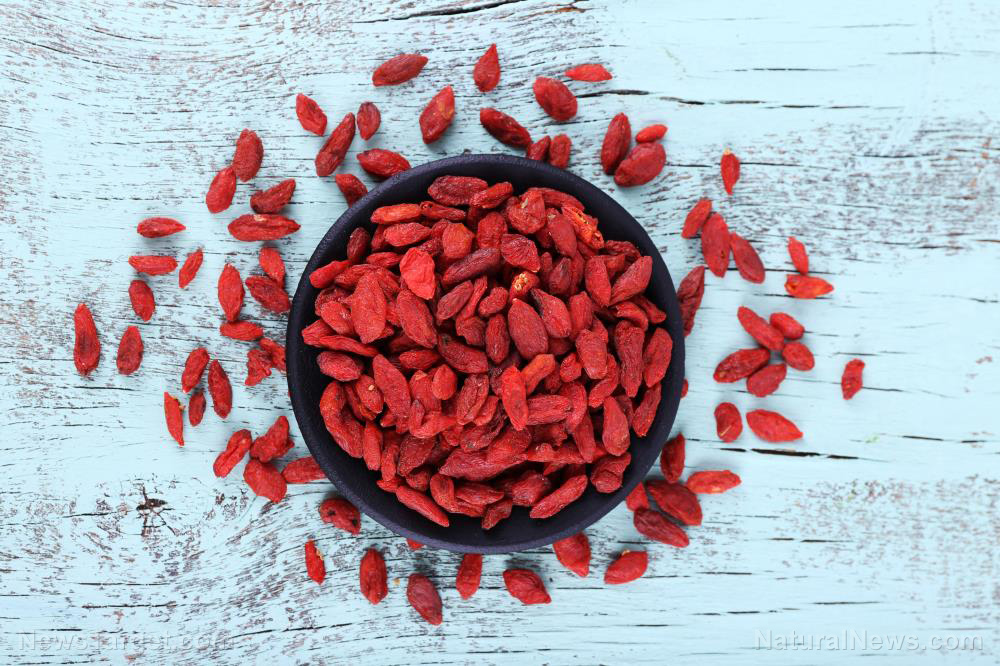Study: Goji berries boost eye health, help prevent vision problems, study concludes
12/21/2022 / By Mary Villareal

A study has found that a small serving of dried goji berries (Lycium barbarum) a day may prevent or delay age-related macular degeneration (AMD).
AMD is the leading cause of vision loss in older individuals and is estimated to affect over 170 million globally. It usually affects people in their 50s and 60s, targeting their central field of vision.
In the small-scale research published December 2021 in Nutrients, the study authors from the University of California, Davis (UC Davis) found that 13 healthy participants aged 45 to 65 who consumed 29 grams or a handful of goji berries five times a week for 90 days increased the density of protective pigments in their eyes. In contrast, 14 study participants who consumed commercial supplements for eye health over the same period did not show an increase in protective pigments. (Related: Discover the healing power of goji berries.)
Lead study author Xiang Li explained that the cohort who consumed goji berries had increased levels of lutein and zeaxanthin. These two pigments filter out harmful blue light, provide antioxidant protection and help protect the eyes from the effects of aging. She dubbed these two pigments as “sunscreen for the eyes.”
The nutritional benefits of goji berries come in handy when addressing AMD. Co-author Glenn Yiu explained that while AMD does not cause total blindness, it can affect one’s ability to read or recognize faces.
A separate study also showed that goji berries can protect the retina from ganglion cells that are responsible for glaucoma, which can lead to vision loss.
Other benefits of goji berries
Goji berries are native to China and have been eaten for generations in hopes of extending a person’s lifespan. The fruit, also called wolfberry in some areas, offers high amounts of protein, vitamin A, vitamin C, riboflavin, potassium, iron, magnesium, copper and zinc. While it provides high levels of various antioxidants, it is especially rich in beta-carotene and zeaxanthin.
Researchers also looked at goji berries for their range of proposed health benefits, including immune function, metabolic syndrome and neurological disorders.
Tested in rabbits under laboratory conditions, goji berries lowered blood glucose, total cholesterol and triglyceride levels. In diabetic rats, it improved insulin resistance.
Some studies also found that goji berry juice has mental health benefits, enhances athletic performance, stimulates a better quality of sleep and induces overall feelings of good health.
Medical professionals, however, caution individuals that take blood thinners to talk to their primary care physicians before consuming products that contain goji, as it may cause an adverse reaction. Goji berries may also interact with diabetes and blood pressure drugs. When eaten in moderation, however, they appear to be safe.
Goji berries can be consumed in different ways. They can be eaten raw, dried, cooked or added to drinks such as herbal teas and juices. They can also be incorporated into a healthy lifestyle and weight loss diet plans, although there is little evidence that they can promote weight loss by themselves.
Goji berries are also said to protect against cancer due to their high levels of antioxidants, including carotenoids, which are responsible for fighting cancer cells. Antioxidants slow tumor growth, reduce inflammation and help remove harmful substances in the body.
Research on mice also found that goji berries may inhibit tumor growth and boost the effectiveness of cancer treatments.
Visit EyeHealth.news for more on how to support healthy vision.
Watch this video that discusses nine health benefits of goji berries.
This video is from the Health Ranger Store channel on Brighteon.com.
More related stories:
Study suggests compounds in goji berries can boost eye health.
Goji Berries: how much do you really know about this superfruit?
Goji berry extract found to be an effective treatment for two deadly tropical diseases.
Sources include:
Submit a correction >>
Tagged Under:
age-related macular degeneration, alternative medicine, AMD, eye health, food cures, food is medicine, ganglion cells, goji berries, lutein, Lycium barbarum, vision problems, zeaxanthin
This article may contain statements that reflect the opinion of the author
RECENT NEWS & ARTICLES
COPYRIGHT © 2017 PREVENTION NEWS





















